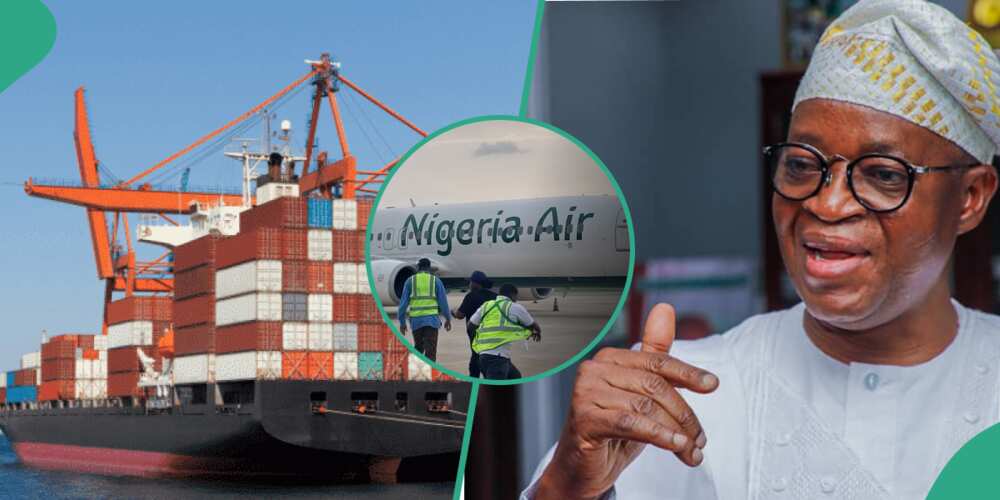Amid Nigeria Air's Failure, FG Considers Floating National Shipping Carrier
- The Minister of Marine and Blue Economy has hinted of a plan to establish a national shipping carrier.
- Oyetola said it was deserving for Nigeria to do so and save charges it continuously pays for chartering vessels.
- He added that he is determined to revamp the industry in alignment with President Tinubu's "Renewed Hope" agenda.
The Federal Government has proposed the creation of a national freight transport carrier in collaboration with the private sector through a Public-Private Partnership arrangement.
The Minister of Marine and Blue Economy, Adegboyega Oyetola, made this announcement during a recent visit to the headquarters of the Nigerian Maritime Administration and Safety Agency (NIMASA) while touring their facilities.
This is coming a week after the suspension of Nigeria's national air carrier, Nigeria Air, following controversies that surrounded the unveiling in Abuja.

Source: UGC
Minister says National carrier will eliminate charges paid to charter vessels
Addressing his commitment to transform the maritime sector and elevate Nigeria to a prominent role, Oyetola articulated his determination to revamp the industry in alignment with President Bola Tinubu's "Renewed Hope" agenda.
According to The SUN, the minister said that Nigeria as the sole member of the Organisation of the Petroleum Exporting Countries (OPEC) lacking a national maritime fleet flying the country's flag, faced an unacceptable situation.
Oyetola pointed out that establishing a national carrier would effectively eliminate the current 30% freight charge associated with chartering vessels.
The Minister quickly clarified that his proposal for a national maritime carrier should not be misconstrued as a call for the revival of the dormant Nigerian National Shipping Line (NNSL).

Read also
Work resumes: Deputy governors assigned responsibilities by CBN, to fix naira, forex, others
Expanding on this point, he expressed his interest in NIMASA's modular floating dock due to its potential to create employment opportunities and reduce capital outflows.
Regarding the prospects of Nigeria's maritime sector, the Minister highlighted that Barbados' economy relies heavily on tourism, emphasizing that Nigeria, one of the world's largest wetlands, possesses significant potential for developing coastal tourism.
No immediate benefit in floating national shipping carrier
An expert in the maritime sector has told Legit.ng that there is no immediate benefit in the Federal Government floating a national shipping carrier.
Reuben Uwanna, Resource Manager at Mainstream Logistics, a Lagos-based clearing and forwarding firm, admitted that while a national shipping carrier will be needed in the long term, the time is not just right for it at the moment.
He said:
I entirely understand why the government is considering floating a national shipping line. If that is had, it would cut some of the costs it is paying for hiring vessels. But the truth is that it is a capital-intensive project that the government should avoid for now, given the pressing areas that need attention most.
Shipowners stay away from Nigeria as cost of shipping crude oil to Europe, US increases
In related news, Legit.ng reported that the cost of shipping crude oil from Nigeria has recently surged to its highest level in over a year, with reports suggesting that some vessel owners are avoiding the country.
The daily rate for ships transporting approximately 1 million barrels of Nigerian crude to Europe has risen by nearly $16,000, reaching $64,000, as per data from the Baltic Exchange.
It has been reported that at least two shipowners have chosen to keep their vessels away from Nigeria due to the issuance of tax bills aimed at recovering unpaid duties dating back to 2010.
Consequently, this situation allows other vessel owners to operate in the region and command higher rates for their services.
Source: Legit.ng


